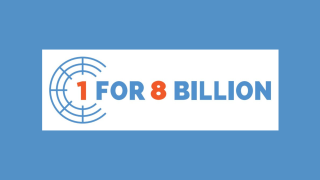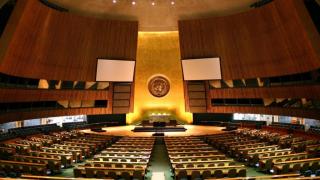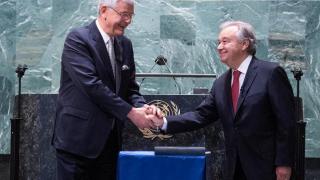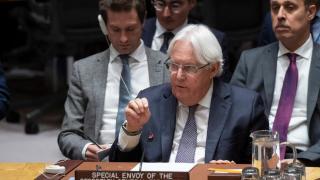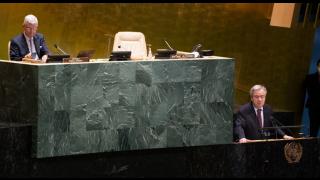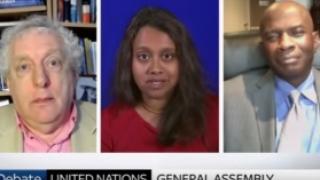
Reform of the United Nations is achievable and could have a "transformative impact" on the effectiveness of our global system, argued UNA-UK Executive Director Natalie Samarasinghe on Sky News and BBC Radio 5 Live. But to make this happen, states must devote more time, money and energy to the Organization.
Flanked by American author Jeffrey Robinson and conservative commentator Armstrong Williams during a Sky News debate on 1 October, Natalie Samarasinghe, responded to wide-ranging criticism of the UN's effectiveness over the past 70 years - from Security Council deadlock regarding the situation in Syria, to the UN Secretary-General's powerlessness amid conflicting national interests.
But according to Natalie, who is co-founder of UNA-UK's 1 for 7 Billion campaign, a better process to select the UN's next leader could transform our global Organization. Opening up the current process - whereby the UN chief is effectively hand-picked by five powerful states - to the wider UN membership would help demonstrate that the UN is capable of change.
“We want the best possible person for this job. We want someone who’s had experience of running a big organisation, who has the political skill to manoeuvre. We need someone who can inspire people. That’s what the UN is; it is hope for millions of people.”
Watch the debate:
In a subsequent interview with presenter Peter Allen on BBC Radio 5 Live, Natalie pointed to the practical achievements of past UN Secretaries-General, from Ban Ki-moon, who has been a champion of LGBT rights, to Kofi Annan, who brokered a historic deal with pharmaceutical companies to make HIV/AIDS treatment cheaper and more accessible to millions around the world.
"[T]here is a lot that these people can achieve, if they are given a proper mandate, hopefully a single term as well so they don’t need to campaign for reappointment. I think this would have an absolutely transformative impact on the UN in terms of engaging the wider membership... but also sending a signal to everyone that the UN is capable of change and that it stands ultimately for the world’s seven billion people, and not just for the countries on the Security Council."
While Natalie was optimistic about the UN's capacity for reform, she conceded that a more effective Organization depends entirely on the political will of its 193 member states.
"Governments [must] realise that they need to... invest time and money - but also their energy - into making the system work. This is a system that has delivered, particularly for us in the West, a great deal of security and prosperity over the past 70 years, but we tend to only pay attention to it when you have all the big shiny speeches in New York. But we should be working to make it stronger all year round."
For the UK, said Natalie, this requires setting out a clear strategy for how it is going to make the UN work better in the forthcoming National Security Strategy and Strategic Defence and Security Review - a major exercise which will determine the UK's response to improtant peace and security issues over the next five years.
Click here to listen to Natalie's interview with Peter Allen on BBC Radio 5 live (from 02:49)
Photo: Natalie Samarasinghe (centre) debates the effectiveness of the United Nations with Jeffrey Robinson (left) and Armstrong Williams (right) on Sky News, 1 October 2015.

